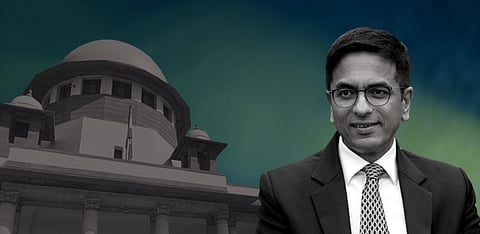

A letter to the Chief Justice of India, written by an organisation of lawyers, highlights the social reality of the legal fraternity, especially in the post-COVID-19 pandemic scenario, when many advocates were compelled to leave the practice. The letter emphasises that women advocates, and those from Dalit, Adivasi and other socially disadvantaged sections of the society suffered economic adversities, yet their concerns have not been adequately addressed.
—–
THE All India Lawyers Association for Justice (AILAJ) have written a letter to the Chief Justice of India (CJI) Dr. D.Y. Chandrachud regarding the need for different organs of the State, the judiciary and the legal fraternity to take necessary steps for ensuring social and economic justice in the legal fraternity. This was pursuant to its campaign for social and economic justice for lawyers in various states across the country, undertaken last month.
The AILAJ is an organisation of lawyers, legal professionals and law students striving to protect the core tenets of India's Constitution, particularly liberty, equality, justice and fraternity.
The AILAJ referred to the CJI's speech at a function organised by the Bar Council of India on November 19, 2022, in which he had said: "If we want to change the face of the legal profession, we have to provide equal opportunity and access to not just women, but also marginalised communities today. So that we can find more diversity on the bench tomorrow."
The AILAJ pointed out that there is a need to acknowledge that the legal profession is "feudalistic and unwelcoming to women and those from marginalised communities". Thus, what can be done to promote and sustain their legal practice, and ensure them equal opportunities and access is a question that remains to be answered.
Highlighting the issues caused by the COVID-19 pandemic, the AILAJ pointed out that the lockdowns laid bare the vulnerable social reality of the legal fraternity.
"The closure of courts plunged legal professionals — particularly those from trial, taluk or district courts, junior and lawyers from marginalised communities, law clerks, notaries, writers, typists, and others in deep financial distress," the letter notes.
The representation discloses that many practising advocates were forced to abandon their practice and return to their villages, and several incurred deep debts. Many families faced destitution when legal professionals lost their lives due to COVID-19.
The letter acknowledges that there were efforts to ameliorate the situation, but points out that the efforts did not match the scale of the devastation caused by the pandemic.
Former CJI N.V. Ramana had written a letter to the Union Ministry of Law and Justice on June 8, 2021, requesting the Union government to address the digital divide within the legal community, particularly in rural and Adivasi areas, and provide financial assistance to advocates, especially to junior advocates, who were struggling to survive during the COVID-19 pandemic.
According to the letter, the former CJI recognised certain issues that needed the immediate intervention of the Union government. These were:
The AILAJ, in the letter, notes that the situation of a large percentage of lawyers is particularly concerning. It referred to a pilot study conducted by the legal think-tank Vidhi Centre for Legal Policy in Delhi in 2020, which found that nearly 80 per cent of advocates practising at the Delhi High Court, with up to two years of professional experience, fall within the income bracket of Rs. 5,000 to 20,000 monthly.
The study, conducted as a part of Vidhi's Justice, Access and Lowering of Delays Initiative, also found out that the starting range of income, in reality, is much lower than this.
The study subsequently surveyed advocates in the high courts of Allahabad, Bombay, Kerala, Madras and Patna, where it was found that 40 per cent of the respondents earned a monthly income between Rs. 2,000 and Rs. 5,000. In the high courts of Calcutta and Gujarat, half of the respondents reported earning less than Rs. 10,000 in a month.
The AILAJ claims to have found that in district and mofussil courts, the majority of lawyers earn less than Rs. 10,000 a month as well. The situation of junior advocates, first-generation advocates, women advocates and particularly advocates from Dalit, Adivasi and other socially disadvantaged sections is worse, the letter avers.
The social disadvantages suffered by women and advocates from Dalit and Adivasi background, and other socially disadvantaged sections, who additionally face discrimination and economic insecurities, have to be addressed, the letter impresses. There can be no diversity on the bench if there is no diversity in the bar, it further states.
According to the AILAJ, it is well-established under constitutional law that affirmative action and reservation are not exceptions to the right to formal equality, but are an aspect of formal equality which takes into consideration the existing inequality in the society and seeks to remedy it.
"Courts are unanimous that for equality to be truly effective or substantive, there must be recognition of existing inequalities in society and the endeavour to overcome them," the letter submits.
In the context of its campaign for ensuring equality of opportunity for historically marginalised sections of the society, the following demands have been made in the letter:
According to AILAJ, meeting these demands is necessary to realise the preambular goals of justice, equality and fraternity, and would be an important step towards democratising the legal fraternity.